The 2020 Mac Mini Unleashed: Putting Apple Silicon M1 To The Test
by Andrei Frumusanu on November 17, 2020 9:00 AM ESTBenchmarks: Whatever Is Available
As we’ve had very little time with the Mac mini, and the fact that this not only is a macOS system, but a new Arm64-based macOS system, our usual benchmark choices that we tend to use aren’t really available to us. We’ve made due with a assortment of available tests at the time of the launch to give us a rough idea of the performance:
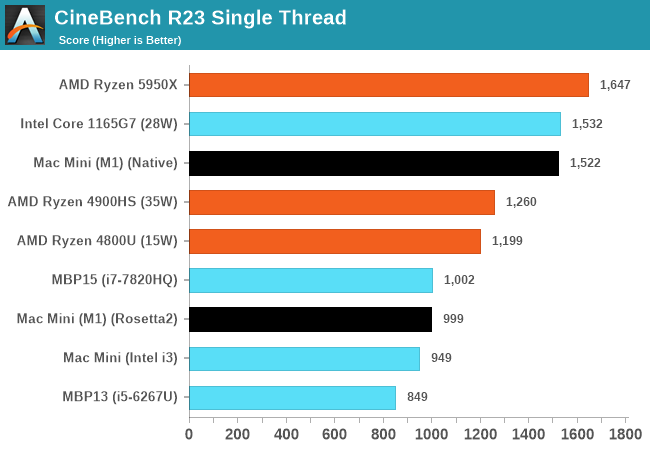
One particular benchmark that sees the first light of day on macOS as well as Apple Silicon is Cinebench. In this first-time view of the popular Cinema4D based benchmark, we see the Apple M1 toe-to-toe with the best-performing x86 CPUs on the market, vastly outperforming past Apple iterations of Intel silicon. The M1 here loses out to Zen3 and Tiger Lake CPUs, which still seem to have an advantage, although we’re not sure of the microarchitectural characteristics of the new benchmark.
What’s notable is the performance of the Rosetta2 run of the benchmark when in x86 mode, which is not only able to keep up with past Mac iterations but still also beat them.
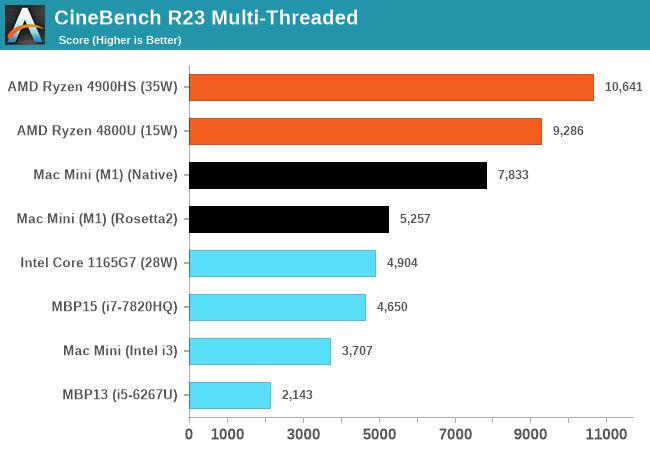
In the multi-threaded R23 runs, the M1 absolutely dominates past Macs with similar low-power CPUs. Just as of note, we’re trying to gather more data on other systems as we have access to them, and expand the graph in further updates of the article past publishing.
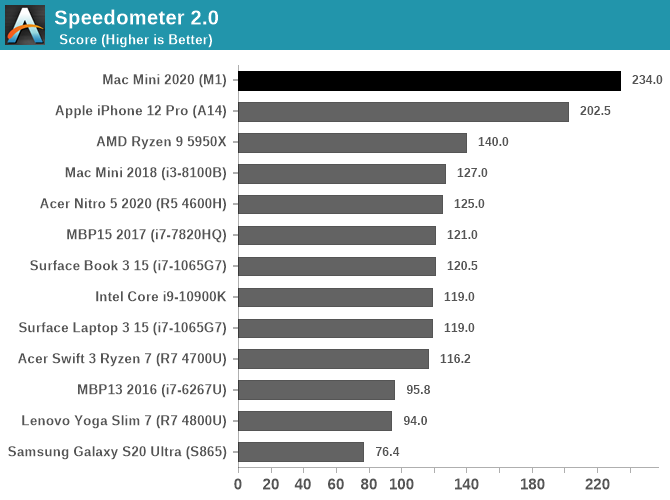
In browser-benchmarks we’ve known Apple’s CPUs to very much dominate across the landscape, but there were doubts as to whether this was due to the CPUs themselves in the iPhone or rather just the browsers and browser engines. Now running on macOS and desktop Safari, being able to compare data to other Intel Mac systems, we can come to the conclusion that the performance advantage is due to Apple’s CPU designs.
Web-browsing performance seems to be an extremely high priority for Apple’s CPU, and this makes sense as it’s the killer workload for mobile SoCs and the workload that one uses the most in everyday life.
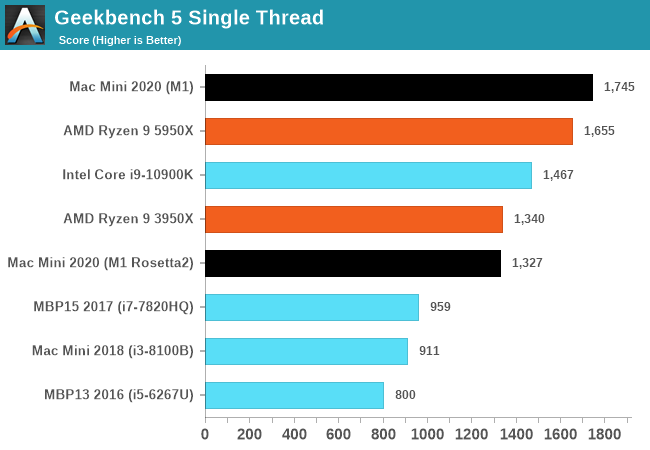
In Geekbench 5, the M1 does again extremely well as it actually takes the lead in our performance figures. Even when running in x86 compatibility mode, the M1 is able to match the top single-threaded performance of last generation’s high-end CPUs, and vastly exceed that of past iterations of the Mac mini and past Macbooks.
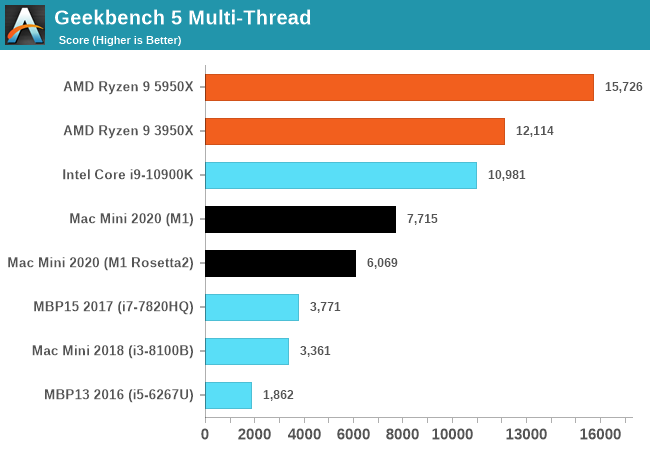
Multi-threaded performance is a matter of core-count and power efficiency of a design. The M1 here demolishes a 2017 15-inch Macbook Pro with an Intel i7-7820HQ with 4 cores and 8 threads, posting over double the score. We’ll be adding more data-points as we collect them.


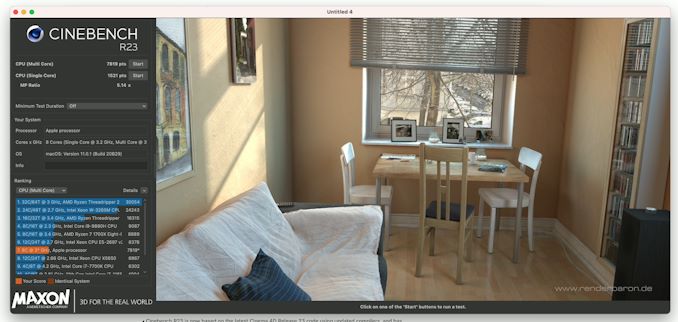








682 Comments
View All Comments
realbabilu - Thursday, November 19, 2020 - link
Since Catalina,intel compiler mafia have issue and incompatibility. The big sur have worse compatibility.https://community.intel.com/t5/Intel-C-Compiler/In...
That's why my hackintosh stay at mojave. The only works for now is gcc apple, and it doesn't have gfortran. I don't know if latest gnu gcc Catalina could works in big sur rosetta 2.
realbabilu - Thursday, November 19, 2020 - link
Dull t9Should be intel compiler have issue
Phemg - Thursday, November 19, 2020 - link
It would be nice a comparison of multi-thread against efficiency cores...QuantumKot - Thursday, November 19, 2020 - link
I wonder whether Apple has removed support for 32 bit instructions from the M1 hardware altogether or it is still there just in case?Jenoin - Thursday, November 19, 2020 - link
"it takes a Ryzen laptop with a Radeon 560X to finally pull even with the Mac Mini"Oh really? A Ryzen, that was the slower of two products in it's product stack, when it launched 3(!) years ago on a 14nm process coupled with a 2 year old refreshed version of a refreshed version of a refreshed version... 14nm GCN based GPU. What do you think the market value of such a laptop would be today assuming you could find one new? $250? $300? This comparison and the language used for it is disingenuous at best.
What a joke.
hagjohn - Thursday, November 19, 2020 - link
Apple Silicon allows Apple to be in the drivers seat. There is no more waiting for intel to release products, which has been pretty hard lately. They have done a damn good job with their first product. I'm excited to say I ordered a M1 Mini (16GB/1TB) and I can't wait to get it.Alexvrb - Friday, November 20, 2020 - link
I'd like to see Rosetta2 compared to the Windows ARM's x86 support. Obviously the QC chip isn't as fast, but I mean as a % of native performance. I'm sure Apple's version has less overhead, but I'm still curious how big the gap is.alufan - Friday, November 20, 2020 - link
Hmm no Nvidia GPU reviews and now no AMD GPU reviews?Seems Anandtech is becoming an intel and Mac site either that or you have seriously annoyed some folks who send out review kits
tuxRoller - Saturday, November 21, 2020 - link
This is a FAR more interesting story. We've finally got a major desktop player going all in with arm and the results are astonishing.That kind of change doesn't happen often.
If you want to read about how many more fps you can get with the news cards read any of more than a dozen benchmarking sites.
Spunjji - Monday, November 23, 2020 - link
I was hoping for an architectural deep-dive on both of them that you don't usually get from other sites.I'm still hoping for that, tbh. I don't much care about it being "on time". It's still beginning to get worrying how badly things have gone, though.